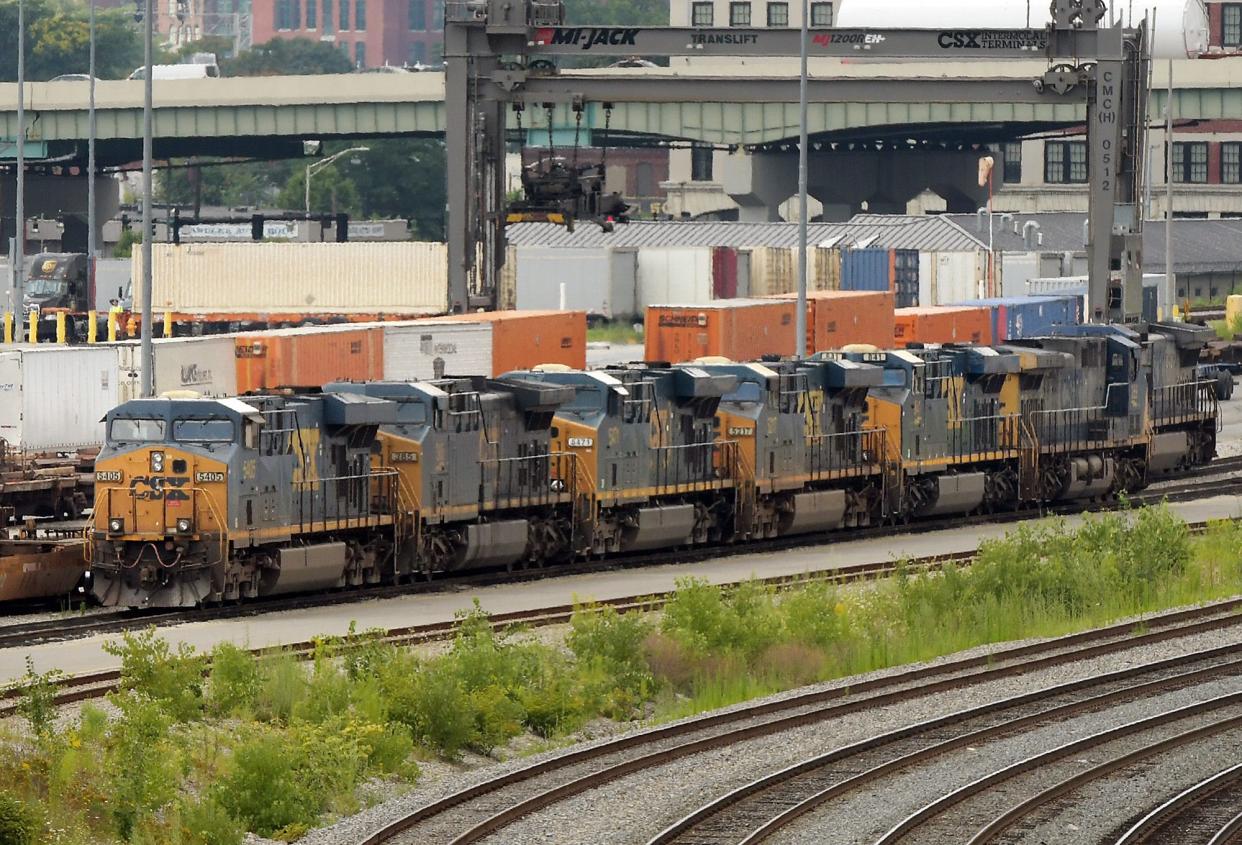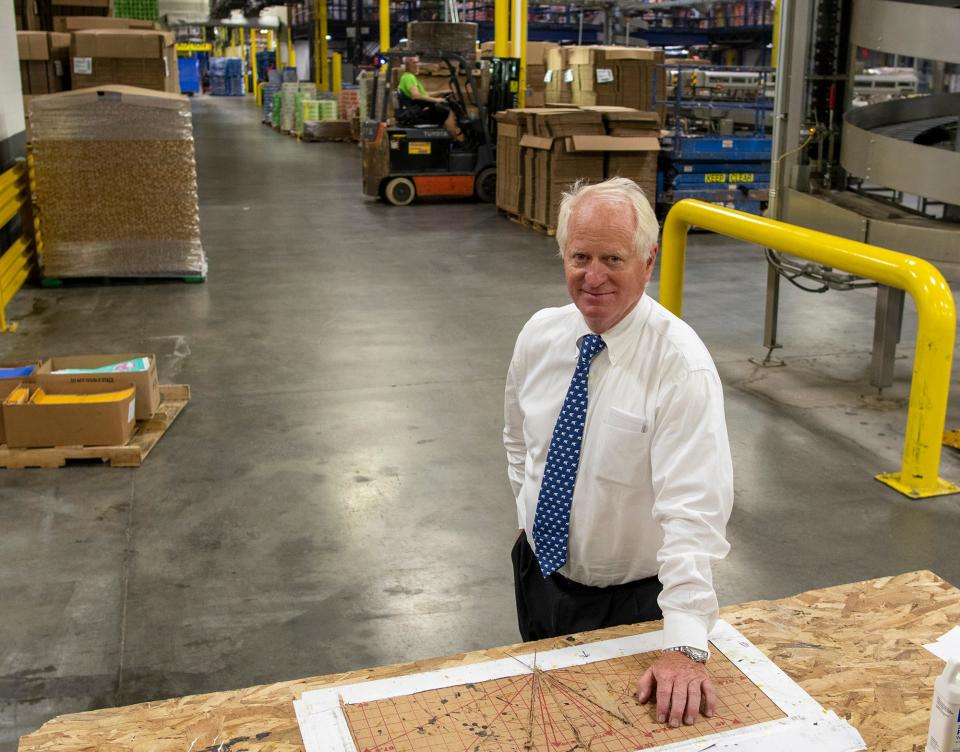Possible national rail strike would be 'devastating,' Polar exec warns

WORCESTER – Some Worcester businesses watched with anxious anticipation Wednesday as Congress was expected to vote on a bill to avert a national rail strike.
It happened, as the U.S. House of Representatives voted 290-137 to support a tentative labor-management contract brokered by the White House in September to avert a strike. The vote did not include paid sick days, a sticking point for labor, as four of 12 rail unions didn't support the tentative deal on that point.
But moments later, the House voted 221-207 to approve a separate measure to add seven days of paid sick days to the contract.
It now moves to the U.S. Senate, where the outcome is uncertain. A 60-vote supermajority is needed for passage.
Before Wednesday's Congressional vote, "devastating" is the word Chris Crowley used to describe the impact on Polar Beverages, and the overall economy, if the nation’s rail workers go on strike in early December.
Crowley’s family owns and operates Polar, where he serves as executive vice president, and he explained that the massive carbonated beverage maker headquartered in Worcester needs supplies brought in by rail to keep the business running.
"We can’t afford a rail strike. The economy would be a disaster."
Chris Crowley, executive vice president, Polar Beverages
The list of needed supplies includes carbon dioxide to make the fizzy drinks, polyethylene terephthalate for plastic bottles that hold the beverages and packaging materials for shipping.
“It will take forever to recover from a strike,” said Crowley. “The supply chain is already delicate, and let’s say a strike lasted only three days. It would take six weeks to get back the wheels under the bus. It would be devastating.”
Imperial Distributors will feel the economic sting from a strike. The Worcester company employs 400 people in Massachusetts and works with suppliers of nonfood items that stock supermarket shelves, like beauty and wellness items.

"(A strike) would clearly have an impact," said Dean Messier, the company's director of human resources. If freight trains stop running, Messier worries there aren't enough trucks to pick up the delivery slack.
"The real impact would be trucking," said Messier. "It's hard to get trucks to transport now. Try converting all shipments to trucking. There's not enough out there to handle that. The government has to step in and do something."
More:Railroad strike update: SMART-TD rejects Biden Admin deal. What are rail unions asking for?
Sick days
The issue is largely the reason why four of 12 national rail unions rejected the tentative deal, and threatened to go on strike if they don't get paid sick days. Getting them is important, according to labor, because without them, management can pressure workers to punch the clock when they're ill. That can lead to not only poor worker health, but also an inability to perform on the job, when performance is critical to the safe transport of goods.
The tentative deal included a 24% pay raise over five years, but it didn't include paid sick days for workers.
The 1926 Railway Labor Act gives Congress the authority to impose the tentative contract or extend the negotiating period. President Joe Biden is pushing for Congress to act, as a strike would reportedly cost the U.S. economy $2 billion daily.
A national strike could happen as soon as next Friday if Congress doesn’t vote to approve the contract.
One labor union that didn't ratify the tentative deal is The Brotherhood of Maintenance of Way Employs, based in Michigan. Clark Ballew, the union's communications director, told the Telegram & Gazette that the union will go on strike if Congress voted down the tentative deal.
However, a strike wouldn't last long, Ballew said, because railroad owners don't want to face the economic fallout and will quickly give the workers the sick days they want.
"If we get out the door, go out on strike, the railroads will come up with paid sick leave," said Ballew. "(The railroads) are banking on Congress to bail them out by approving the tentative deal."
Locally, the Worcester chapter of the Democratic Socialists of America doesn't support Congressional approval of a deal that doesn't include sick days. In an email, the local chapter said railroads rake in billions of dollars that are "grinding down rail workers," while Democrats and the White House rush to impose a deal without sick days.
"DSA is 100% with the railroad workers," said the email.
Supports labor
Crowley appeared to side with labor on its demand for paid sick days when he said, “It sounds like a legitimate need that both sides should be able to work out.” If they don’t, Crowley said, he would likely have to cut worker hours to combat a drop in revenue from a strike.
Worcester and Central Massachusetts would take a hit, said Tim Murray, president and chief executive officer of the Worcester Regional Chamber of Commerce.
Murray noted that 30% of rail freight arriving in New England comes through rail yards in Worcester and Central Massachusetts. He used that figure to stress his point that not only does a lot of freight move through the area, but it’s also an industry that employs many people.
As for the sick-day issue, Murray said that since eight of the 12 labor unions voted to support the deal that's on the table, the majority should rule the day.
“The will of the minority is holding the majority up here," said Murray. “There are potential devastating consequences to the economy in Central Massachusetts, New England and across the country. It’s not unreasonable for the president to look for federal action here.”
Passenger service
If a strike occurs, disruptions are not expected for passenger rail service in and out of Worcester, said a prepared statement from Keolis Commuter Services, the company that operates and maintains the Massachusetts Bay Transportation Authority’s commuter rail system.
Freight carrier CSX and other freight partners have access to rail lines in the Worcester area, but the rail is owned by the MBTA and dispatched by Keolis.
“Although there are no anticipated impacts to Commuter Rail service, the MBTA, Keolis and our operating partners will continue to monitor the situation closely,” the Keolis statement said.
Whatever it takes
That is how Crowley views the approach that must be taken to prevent a rail strike. If both sides can't reach agreement, Congress has to step in.
"Whatever it takes. We can’t afford a rail strike," he said. "The economy would be a disaster. It would be like the Grinch taking Christmas."
Contact Henry Schwan at henry.schwan@telegram.com. Follow him on Twitter @henrytelegram
This article originally appeared on Telegram & Gazette: Concern in Worcester about a possible national rail strike.

